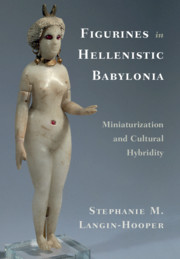Book contents
- Figurines in Hellenistic Babylonia
- Figurines in Hellenistic Babylonia
- Copyright page
- Dedication
- Contents
- Acknowledgments
- Author’s Note
- Introduction
- Chapter One A Question of Intimacy: Miniaturization and Figurines
- Chapter Two Fascination with the Tiny: Interacting with Figurines
- Chapter Three Three’s a Crowd: Spectatorship of Figurines
- Chapter Four Images of the Self: Identifying with Figurines
- Chapter Five The Global and the Local: Making Cultural and Social Choices with Figurines
- Conclusion: Life in Miniature
- Notes
- Bibliography
- Index
Introduction
Published online by Cambridge University Press: 19 December 2019
- Figurines in Hellenistic Babylonia
- Figurines in Hellenistic Babylonia
- Copyright page
- Dedication
- Contents
- Acknowledgments
- Author’s Note
- Introduction
- Chapter One A Question of Intimacy: Miniaturization and Figurines
- Chapter Two Fascination with the Tiny: Interacting with Figurines
- Chapter Three Three’s a Crowd: Spectatorship of Figurines
- Chapter Four Images of the Self: Identifying with Figurines
- Chapter Five The Global and the Local: Making Cultural and Social Choices with Figurines
- Conclusion: Life in Miniature
- Notes
- Bibliography
- Index
Summary
This book investigates the role of anthropomorphic figurines as agents of cross–cultural identity production and social negotiation in Hellenistic Babylonia. Babylonia, in the southern region of the modern-day country of Iraq (see Map), was conquered by Alexander the Great in 330 BCE. This event began the so-called Hellenistic period, a time marked by widespread migrations of Macedonian and Greek peoples (often referred to together as “Greeks”) into the already ancient and culturally diverse cities of the Ancient Near Eastern region. Babylonians, other Mesopotamians, Persians, West Semitic peoples, and, eventually, Parthians also participated in these communities. Both material culture and textual records from Hellenistic Babylonia reveal a complex society defined and pervaded by cross-cultural interaction. The end date of the Hellenistic period is less fixed.
- Type
- Chapter
- Information
- Figurines in Hellenistic BabyloniaMiniaturization and Cultural Hybridity, pp. 1 - 12Publisher: Cambridge University PressPrint publication year: 2020

